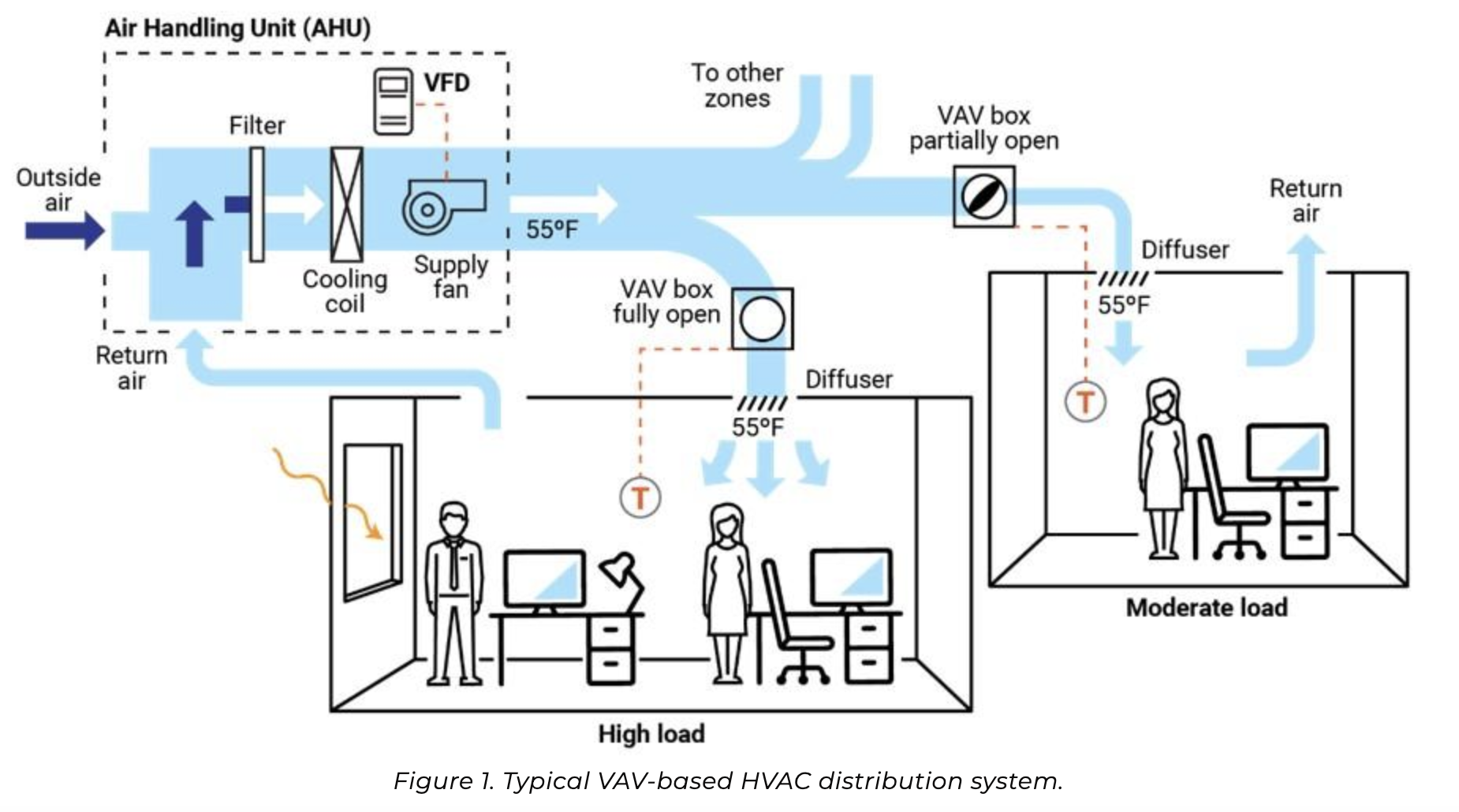Your office's HVAC system is a vital part of your company's infrastructure. It is one of the most critical elements of creating an environment in your office that your team is comfortable in. Not only that, but it will have huge implications on the overall Net Present Value of your lease.
Understanding how it works and keeping it maintained can save you money, time, and headaches down the road. Here are some tips on what corporate tenants should know about their office's HVAC system.
The Importance of HVAC in the Workplace
Working in an office environment without efficient heating, ventilation, or air conditioning (HVAC) can be costly and uncomfortable. A poor HVAC system means that you're either too hot or too cold, or perhaps both at the same time within different parts of the office.
In fact, office temperatures that are too hot or cold can quickly plummet workplace productivity and morale. According to experts at Alford Mechanical, “changing the thermostat by 2 percent can lead to a 10 percent loss in productivity. Another study showed that at 68 degrees, employees made 44 percent more errors than when the thermostat was set at 77 degrees.”

Creating comfortable environments is more important now more than ever. Since the WFH movement, companies are competing with comfortable environments like people's homes. Businesses now need to go above and beyond to ensure that their offices inspire maximum comfort and productivity if they want employees in the office. Read more about how to use your corporate real estate to become a more competitive recruiter.
The right HVAC system is the answer to creating this perfect environment, providing a comfortable temperature year-round so employees can get the job done without breaking a sweat. Not only that but keeping all office occupants at the same temperature leads to better team dynamics and encourages a healthy work/life balance. So, if you want to keep office harmony then it’s time to get serious about your good ol’ HVAC system!
Side note: While your HVAC system is critical to creating the optimal office environment, it is only one of many considerations you should be prepared to know about when finding your next office space. Learn all the tips, tricks, and concerns corporate tenants need to find the best office space, for the best price, in our free video course below.
How an HVAC System Works
Understanding how an HVAC system works is a great way to ensure its longevity and healthy airflow in your office. In the simplest terms, HVAC stands for Heating, Ventilation, and Air Conditioning. A key component of an HVAC system is the air filter, which intercepts dirt and dust particles before they enter the air you breathe. It does this by forcing air through a fine mesh screen that catches these potential contaminants as it passes through it. The remaining cool or warm air comes out of the vents where it eventually circulates throughout the area.
HVAC systems can even be equipped with additional features like HEPA filters that amplify the efficiency of the base models. They can eliminate 99.97% of the micro-contaminants. Read more about modern features for health and safety. Modern Amenities to Include in Your Return to Office.

Different Types of HVAC Systems
When it comes to heating, ventilation, and air conditioning, or HVAC systems, most people understand their importance but are often confused by the various types out there.
But all these different options mean you can have a tailored system that meets your specific needs and keeps everyone as happy as they can be.
There are some basics to consider:
- The size and complexity of the space
- Energy efficiency requirements
- Occupant comfort levels
- Budget
Before you make any decisions, reach out to an HVAC professional who can help assess your unique needs. An engineer can walk you through factors like finding the necessary sizing, which is measured typically in tons. The tonnage required of your HVAC system will depend on:
- Your geographic region
- The density of your office
- The building's size
- The system's design, etc.
Geographical concerns are obvious. An office in Scottsdale, Arizona will have different requirements than more moderate climates like Virginia. Of course then, these distinctions will differ further in a colder climate like Boston.
The other factor is the office density. An office with employees spaced every 200 square feet will have a different human heat load than office where the square footage per person is half of that. This is similar concern to the heat load given off equipment and technology. However, this concern is becoming less prominent as computers become more thermally efficient.
Essentially, tons are measured in BTUs, or British Thermal Units. One ton removes heat at a rate of 12,000 BTUs per hour. According to AirSev the calculation to find your optimal tonnage is as follows:
"Multiply the number of square feet you’re cooling times 25. This equals the total number of BTUs you need to adequately cool your space. Next, divide that number by 12,000 to determine the tonnage capability you need in your new air conditioning unit."
Remember the Goldie Locks Rule: Not too much or too little, but just right. Too big of an HVAC system, and it can become inefficient and costly. Too little of a system will take too long and need to be on for extended periods of time to create a difference in temperature. This will also drive up energy bills.
Still, it’s good to be familiar with what’s out there. The following are the varying types of HVAC systems and according to your business and its needs, your best option will differ.
Single Split System
Single-split systems hook up to the building’s existing ductwork. With this configuration, every indoor unit has an outdoor unit. Temperature control is usually limited to a singular room, so they are not sufficient for large office or warehouse use by any means.

Multi-Split System
Multi-split systems are also hooked up to the building’s existing ductwork. However, multiple indoor units can connect to a larger, singular outdoor unit. They are best for interior spaces with many walls and multiple levels. Multi-room spaces and large commercial spaces commonly have this system.

Variable Refrigerant Flow
Variable Refrigerant Flow (VRF) denotes systems that utilize refrigerant as a means of heating and cooling. They shift refrigerants to the specific zone of the building that needs to be heated or cooled. They are known for their energy-efficiency.
VRFs are seen commonly in mixed-use commercial spaces.

Variable Air Volume
Variable Air Volume (VAV) generates constant air circulation for different environments. They are perfect for multi-room spaces that demand separate heating and cooling. This type is big for office buildings. They also allow you to set different temperatures for different rooms.

Cost Considerations for Your HVAC
Getting granular with your HVAC is so important because it is a predominant aspect of your operating expenses, which can become a third of your overall cost of occupancy in a mature lease. Unfortunately, there can be hidden “gotcha’s” like over-time HVAC costs in an office lease that can really add up. For example, landlords typically charge for over-time electric rate for offices open over ~55 hours week. This can quickly add up, especially if only several of your employees are occupying the space after hours. Rates can be jacked up, reaching between $50 to $150 per hour.
Overtime HVAC costs are a concern many corporate tenants do not anticipate.
That is why it’s so important to work with a True Tenant Rep™. They know all the dirty details in leases that lose tenants money. As another example, how old is your building’s HVAC system?
If the space is second-generation or already has HVAC systems, it is critical to ask your landlord’s team how old they are. While the landlord should be the one maintaining them for sure, an antiquated system will make it difficult to give you the correct heating, ventilation and air-conditioning (HVAC). You may be responsible for all or part of the HVAC costs for your space and/or a prorated portion of the common areas within the building. The older the system, the more inefficient they will be.
If the HVAC systems’ usable lifespan is beyond the length of your tenancy, your landlord may cover the cost in the Tenant Improvement Allowance. However, specific systems may come out of the tenants’ budget (even though it may be worth it).
The Right HVAC System in Your Next Office
So, there you have it. Your building’s HVAC system will make or break your office environment. The right system will provide tenants with temperature control all year round and healthier environments, while also providing savings in energy costs.
If you're in a building that doesn't have the right HVAC or you're looking for new office space, you'll need to negotiate with your landlord. This is especially important because you want to avoid financially crippling repair bills due to wear and tear or getting taken advantage of with the headaches of an old system. So, don’t leave it to chance. Letting a True Tenant Rep™ at iOptimize Realty® handle your CRE considerations and take the pain out of negotiating.
Working with a rep with 30+ years of market experience allows you to rest assured knowing your budget is safe. True Tenant Reps™ can negotiate on your behalf to even get your landlord to cover the cost of a new system in a Tenant Improvement Allowance (and more).
Learn more about why you shouldn't negotiate without a True Tenant Rep™:
5 Reasons Why You Shouldn't Negotiate Your Lease Without Representation.
Learn how a True Tenant Rep™ can help you today.









